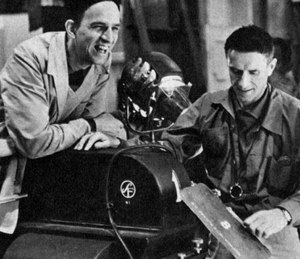VIDEO: We Now Remember Ingmar Bergman's Other Late Cinematographer
 Sad news from Sweden this week as Gunnar Fischer, the cinematographer who shot Ingmar Bergman's masterpieces The Seventh Seal, Wild Strawberries and a fistful of other early-career efforts from the iconic auteur, has passed away in Stockholm. He was 100 and had recently been suffering from "an infection and a fever." Let's remember one of his finest screen moments.
Sad news from Sweden this week as Gunnar Fischer, the cinematographer who shot Ingmar Bergman's masterpieces The Seventh Seal, Wild Strawberries and a fistful of other early-career efforts from the iconic auteur, has passed away in Stockholm. He was 100 and had recently been suffering from "an infection and a fever." Let's remember one of his finest screen moments.
To the extent he is known for the dozen films he made with Bergman between 1948 and 1960 -- from Port of Call to The Devil's Eye -- a sizable chunk of Fischer's renown can be attributed to who eventually succeeded him behind Bergman's camera: Sven Nykvist, whose 22 films and two Oscars with Bergman set a standard for director/DP collaborations that persists to this day. It's not uncommon for filmmakers to make numerous classics with multiple cinematographers -- Francis Ford Coppola had four in his eight-year run from The Godfather to Apocalypse Now -- but it's not often that we see a period as fertile, influential and protracted as the Bergman/Fischer era give way to something even more fertile, influential and protracted. You could argue (and maybe I am) that Bergman owed an enduring creative debt to Fischer, if only because his wariness of the cameraman's hard lights and rigid black-and-white compositions drove the director to the softer imagery that he and Nykvist explored so exquisitely (and, finally, in color).
I love Fischer's opening to Wild Strawberries, in which Dr. Isak Borg (Victor Sjöström) recounts a nightmare only Bergman could conceive: An empty street, sun blazing, clocks without hands, disfigured wraiths, and ultimately a horse-drawn hearse to fill in the blanks on just where, exactly, Borg has found himself. It foreshadows Borg's journey to collect an academic honor that signals the end of something, but Borg's imagination is a couple steps ahead. Even more than The Seventh Seal's notorious chess match with death, the sequence refined a tone of mortal fear that would underscore Bergman's work for nearly a half-century to come: No matter our class, our achievements, our lifestyles or our ideology, we're all on our way to the same place. And what if we're there already? I mean, look around: Could there be any more glaring harbinger of imminent, equalizing doom than The Green Lantern?
Anyway, you should totally watch a Bergman/Fischer film when you get a free evening. They are very good. RIP.
· Gunnar Fischer, Bergman's cinematographer, dies at 100 [Washington Post]
